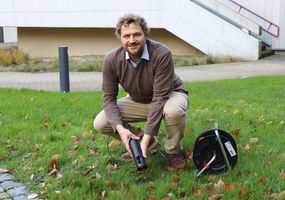Geothermal Energy Systems
The English-language master's degree programme in Geothermal Energy Systems (M.Sc.) offers specialized training in the field of sustainable energy production from geothermal sources.
The focus is on the scientific, technical, and economic fundamentals of geothermal energy use - from exploration and reservoir technology to heat and power generation and the integration of geothermal systems into modern energy structures.
At a glance
- Degree:
- Master of Science
- Standard period of study:
- 3 semesters
- Programme start:
- Summer and winter semester
- Campus:
- Central Campus Bochum
- Instruction language:
- English
- Credit points:
- 90 credit points
- Type of programme:
- Full-time studies
- Type of admission (NC):
- Open admission (no NC)
Details about the program
The program is aimed at alumnus/alumna of bachelor's degree programs in engineering or geosciences who wish to deepen their knowledge of renewable energy systems and pursue an international career in the energy industry or research.
Through practical project work, laboratory exercises, and research collaborations—in particular with the Fraunhofer Institute for Energy Infrastructure and Geothermal Energy (IEG)—students acquire application-oriented skills that prepare them specifically for the challenges of the global energy market.
In the master's degree programme in Geothermal Energy Systems, you will deepen your knowledge of the scientific, technical, and economic fundamentals of geothermal energy production.
The content focuses on:
- Reservoir Engineering & Hydrogeology – Examination of the thermal, hydraulic, and mechanical processes in the reservoir, reservoir evaluation, and optimization
- Drilling and plant technology – Planning and operation of geothermal wells, power plants, heating systems, and heat storage facilities
- Geochemistry and geophysics – Analysis of rock and fluid processes, geophysical exploration, and data interpretation
- Numerical modeling & simulation – Use of modern tools such as FEFLOW or Modelica for reservoir and system analysis
- Energy and environmental policy – Evaluation of the economic, ecological, and regulatory framework conditions of sustainable energy systems
There is a special focus on interdisciplinary project work and the practical application of scientific methods.
Thanks to the international orientation of the degree programme, students also acquire important communication and teamwork skills in intercultural environments.
Course structure, modules, and regulations
- pdf 729 KB Examination regulations for the master's degree programme in Geothermal Energy Systems As of: 09.2025
- pdf 323 KB Module manual for the master's degree programme in Geothermal Energy Systems As of: 09.25
- pdf 651 KB Module examinations master's degree programme in Geothermal Energy Systems As of: 10.25
- pdf 666 KB Study plan for the master's degree programme in Geothermal Energy Systems As of: 09.25
The prerequisite for admission to the Master's programme in Geothermal Energy Systems is a qualifying degree (Bachelor's or Dipl.-Ing. degree) from a minimum 7-semester (210 credit points) engineering or natural sciences programme with an energy focus, or a minimum 7-semester (210 credit points) geosciences programme with a focus on geology, hydrogeology, geophysics, geomechanics, georesources or geothermal energy at a state or state-recognised university with:
- an overall grade of 2.5 (up to 2.59) or better
- an ECTS grade of B or better, or
- an overall grade worse than 2.5 but better than 3.0 (meaning 2.6 to 2.9), if a meaningful assessment of suitability for the Master's programme in Geothermal Energy Systems is submitted. The assessment must have been prepared by a university lecturer who taught the applicant in their first professionally qualifying degree. The examination board decides on the recognition of the assessment and admission to the programme.
Graduates of a bachelor's programme equivalent to 180 credit points are admitted to the master's programme, with the requirement that they must acquire additional alignment credits (usually 30 credit points) before registering for their master's thesis.
The decision on the academic comparability of degree programmes is made by the chair of the examination board. The chair of the examination board also determines whether and which prerequisites these applicants may have to make up for.
Applicants must provide proof of their English language skills at the required level C1 of the Common European Framework of Reference for Languages (CEFR).
Any questions? For more information, please contact:
Opportunities after graduation
With a Master of Science in Geothermal Energy Systems, you will be well prepared for positions of responsibility in the international energy sector.
Typical employers and fields of activity are:
- Geothermal and energy companies – planning, operation, and optimization of geothermal plants and heating networks
- Engineering and consulting firms – site analyses, feasibility studies, project planning, and simulation
- Research and development institutes – collaboration on projects for the further development of sustainable energy technologies
- Public administration and energy policy – consulting, approval, and planning in the fields of energy, environment, and infrastructure
- Science and teaching – opportunity to pursue a doctorate, PhD in geothermal energy, energy technology, or environmental sciences
The combination of technical expertise, scientific thinking, and international practical experience opens up excellent prospects for you – both in industry and in research and politics.
The degree programme in the university magazine

Study Geothermal Energy Systems: Heat from Below
New English-language master's degree programme focuses on energy generation from geothermal sources.


